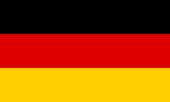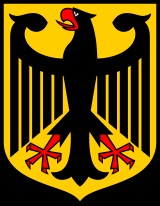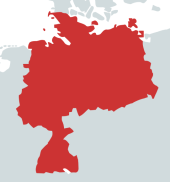Federal Republic of Germany: Difference between revisions
No edit summary |
No edit summary |
||
| (3 intermediate revisions by the same user not shown) | |||
| Line 5: | Line 5: | ||
German: Bundesrepublik Deutschland | German: Bundesrepublik Deutschland | ||
|common_name = Germany | |common_name = Germany | ||
|image_flag = [[File:Flag (1).jpg]] | |image_flag = [[File:Flag (1).jpg|170px]] | ||
|image_coat = [[File:Coat of arms of Germany.svg.jpg]] | |image_coat = [[File:Coat of arms of Germany.svg.jpg|170px]] | ||
|symbol_type = Coat of arms | |symbol_type = Coat of arms | ||
|image_map = [[File:German territory.png]] | |image_map = [[File:German territory.png|170px]] | ||
|national_motto = "Einigkeit und Recht und Freiheit" | |national_motto = "Einigkeit und Recht und Freiheit" | ||
|national_anthem = "Das Lied der Deutschen" | |national_anthem = "Das Lied der Deutschen" | ||
| Line 63: | Line 63: | ||
|Constitution = link to constitution | |Constitution = link to constitution | ||
|discord = link to discord | |discord = link to discord | ||
}} | }}'''Germany''', officially the '''Federal Republic of Germany''', was a country in the western region of Central Europe. | ||
'''Germany''', officially the '''Federal Republic of Germany''', | |||
== Etymology == | == Etymology == | ||
The English word ''Germany'' derives from the Latin ''Germania'', which came into use after Julius Caesar adopted it for the peoples east of the Rhine. The German term ''Deutschland'', originally ''diutisciu land'' ('the German lands') is derived from ''deutsch'' (cf. ''Dutch''), descended from Old High German ''diutisc'' 'of the people' (from ''diot'' or ''diota'' 'people'), originally used to distinguish the language of the common people from Latin and its Romance descendants. This in turn descends from Proto-Germanic *''þiudiskaz'' 'of the people' (see also the Latinised form ''Theodiscus''), derived from *''þeudō'', descended from Proto-Indo-European *''tewtéh₂-'' 'people', from which the word ''Teutons'' also originates. | The English word ''Germany'' derives from the Latin ''Germania'', which came into use after Julius Caesar adopted it for the peoples east of the Rhine. The German term ''Deutschland'', originally ''diutisciu land'' ('the German lands') is derived from ''deutsch'' (cf. ''Dutch''), descended from Old High German ''diutisc'' 'of the people' (from ''diot'' or ''diota'' 'people'), originally used to distinguish the language of the common people from Latin and its Romance descendants. This in turn descends from Proto-Germanic *''þiudiskaz'' 'of the people' (see also the Latinised form ''Theodiscus''), derived from *''þeudō'', descended from Proto-Indo-European *''tewtéh₂-'' 'people', from which the word ''Teutons'' also originates. | ||
==Incorporation into the Reich== | |||
Germany was unified with [[Berlinia]] on the 4th of April 2024 ending the [[German Three State Crisis]]. | |||
[[Category: Countries]] | |||
Latest revision as of 14:06, 14 April 2024
Germany, officially the Federal Republic of Germany, was a country in the western region of Central Europe.
Etymology
The English word Germany derives from the Latin Germania, which came into use after Julius Caesar adopted it for the peoples east of the Rhine. The German term Deutschland, originally diutisciu land ('the German lands') is derived from deutsch (cf. Dutch), descended from Old High German diutisc 'of the people' (from diot or diota 'people'), originally used to distinguish the language of the common people from Latin and its Romance descendants. This in turn descends from Proto-Germanic *þiudiskaz 'of the people' (see also the Latinised form Theodiscus), derived from *þeudō, descended from Proto-Indo-European *tewtéh₂- 'people', from which the word Teutons also originates.
Incorporation into the Reich
Germany was unified with Berlinia on the 4th of April 2024 ending the German Three State Crisis.


